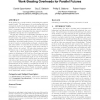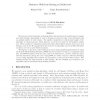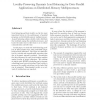790 search results - page 3 / 158 » Limits of Work-Stealing Scheduling |
SPAA
2010
ACM
14 years 3 months ago
2010
ACM
In dynamically multithreaded platforms that employ work stealing, there appears to be a fundamental tradeoff between providing provably good time and space bounds and supporting S...
SPAA
2009
ACM
14 years 11 months ago
2009
ACM
Work stealing is a popular method of scheduling fine-grained parallel tasks. The performance of work stealing has been extensively studied, both theoretically and empirically, but...
ICALP
2010
Springer
14 years 26 days ago
2010
Springer
We present a new deterministic sorting algorithm that interleaves the partitioning of a sample sort with merging. Sequentially, it sorts n elements in O(n log n) time cache-oblivi...
JISE
2002
13 years 10 months ago
2002
Load balancing and data locality are the two most important factors in the performance of parallel programs on distributed-memory multiprocessors. A good balancing scheme should e...
IEEEPACT
2009
IEEE
14 years 5 months ago
2009
IEEE
Parallel programming is a requirement in the multi-core era. One of the most promising techniques to make parallel programming available for the general users is the use of parall...



